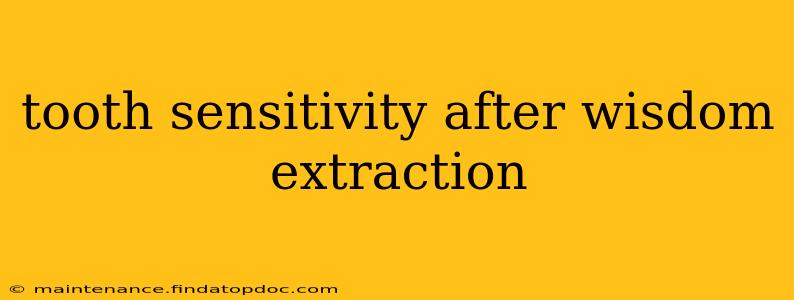Wisdom teeth extractions are common, but dealing with the aftermath, particularly tooth sensitivity, can be challenging. This comprehensive guide explores the causes of post-extraction sensitivity, effective treatment options, and preventative measures you can take.
Why is My Tooth Sensitive After Wisdom Tooth Removal?
Post-extraction sensitivity is a relatively common experience. Several factors contribute to this discomfort:
-
Nerve Irritation: The extraction process can temporarily irritate the nerves surrounding the extraction site and adjacent teeth. This irritation manifests as heightened sensitivity to temperature changes (hot or cold) and pressure.
-
Exposed Dentin: During the extraction, the protective enamel layer might be slightly compromised, exposing the underlying dentin. Dentin is more porous than enamel and contains microscopic tubules leading to the nerve. These tubules make the tooth more vulnerable to stimuli.
-
Dry Socket: A dry socket (alveolar osteitis) is a painful complication where the blood clot protecting the extraction site dislodges. This exposes the bone, leading to intense sensitivity and throbbing pain. This is less about general sensitivity and more about a specific, severe pain in the extraction area.
-
Infection: An infection at the extraction site can also trigger inflammation and heightened sensitivity in surrounding teeth.
-
Adjacent Tooth Damage: In some cases, neighboring teeth might experience some minor damage during the extraction procedure, resulting in increased sensitivity.
What Can I Do to Treat Tooth Sensitivity After Wisdom Tooth Removal?
Managing sensitivity involves both immediate and long-term strategies:
-
Over-the-Counter Pain Relief: Medications like ibuprofen or acetaminophen can help alleviate pain and reduce inflammation. Always follow the dosage instructions on the packaging.
-
Saltwater Rinses: Gently rinsing your mouth with warm saltwater several times a day can help cleanse the extraction site, reduce inflammation, and promote healing.
-
Prescription Medications: If over-the-counter pain relievers prove insufficient, your dentist might prescribe stronger pain medication or antibiotics to combat infection.
-
Sensitivity Toothpaste: Using a toothpaste specifically formulated for sensitive teeth can help desensitize the affected areas over time. These toothpastes typically contain ingredients that block the tubules in the dentin, reducing sensitivity.
How Long Does Tooth Sensitivity After Wisdom Tooth Removal Last?
The duration of sensitivity varies significantly depending on individual healing rates and the complexity of the extraction. Generally, mild sensitivity resolves within a few days to a couple of weeks. However, more persistent or severe sensitivity might warrant a follow-up appointment with your dentist.
Can I Prevent Tooth Sensitivity After Wisdom Tooth Removal?
While you can't completely eliminate the risk, certain preventative measures can minimize the chances of experiencing post-extraction sensitivity:
-
Follow Post-Operative Instructions Carefully: Adhering strictly to your dentist's instructions regarding post-operative care is crucial. This includes avoiding smoking, using a straw, and consuming excessively hot or cold foods or drinks.
-
Maintain Good Oral Hygiene: Meticulous oral hygiene, including gentle brushing and flossing of non-affected areas, helps prevent infections and promotes healing. However, avoid vigorous brushing or flossing near the extraction site.
Is Tooth Sensitivity After Wisdom Tooth Removal Normal?
Yes, some degree of tooth sensitivity after wisdom tooth removal is generally considered normal. However, severe, persistent pain, or signs of infection warrant immediate attention from your dentist.
When Should I Call My Dentist About Tooth Sensitivity After Wisdom Tooth Removal?
Contact your dentist if you experience:
- Severe or worsening pain.
- Signs of infection (e.g., swelling, redness, pus).
- Persistent bleeding.
- High fever.
- Sensitivity that lasts for more than two weeks.
This information is for general knowledge and does not constitute medical advice. Always consult with your dentist or oral surgeon for personalized guidance and treatment regarding your specific situation.
